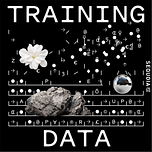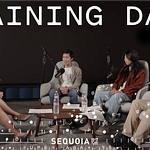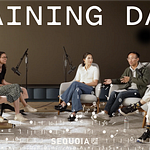Post methodology: Claude 4.0 via custom Dust assistant @TDep-SubstackPost with the system prompt: Please read the text of the podcast transcript in the prompt and write a short post that summarizes the main points and incorporates any recent news articles, substack posts or X posts that provide helpful context for the interview. Please make the post as concise as possible and avoid academic language or footnotes. please put any linked articles or tweets inline in the text. Please refer to Podcast guests by their first names after the initial mention. Light editing and reformatting for the Substack editor.Former OpenAI VP of Research Bob McGrew joined the Training Data podcast with a bold prediction: 2025 will be "the year of reasoning." His insights reveal how AI development is crystallizing around three core pillars—and why this matters for everyone from startup founders to parents.
The AI Trifecta
Bob breaks down AI's evolution into three fundamental components: pre-training (building base intelligence), post-training (crafting model personality), and reasoning (the chain-of-thought capabilities that let models think before responding). The reasoning breakthrough is what allowed OpenAI's o3 to use tools as part of its thought process—something o1 couldn't do just months earlier.
This isn't just technical progress. Bob argues these three legs represent the complete stool of AI development. "I think if you go forward to 2030 or 2035 and look back, we're not going to see any new fundamental trends beyond those," he says. It's a controversial take that suggests the core architecture of intelligence is largely solved.
The Commoditization Problem
Here's where things get interesting for entrepreneurs. Bob predicts that AI agents will be "priced at the cost of compute due to competition." Think you can build an AI lawyer and charge premium rates? Think again. Once there's infinite supply of the highest capability intelligence, pricing power evaporates.
The opportunity lies in deep domain expertise that goes beyond what frontier models offer. Companies like Distyl succeed by building systems that extract context from within businesses and feed it to models—work that requires understanding specific enterprise workflows, not just training better models.
Robotics Gets Its Moment
Bob is particularly excited about robotics, calling it reminiscent of "where AI was a few years ago." The combination of language models with vision encoders gives robots a "head start at doing generic tasks." While OpenAI spent years teaching a robot to manipulate a Rubik's Cube, companies like Physical Intelligence can now tackle laundry folding and cardboard packing in months, not years.
The difference? They're building on a decade of AI infrastructure rather than starting from scratch.
Coding's Threshold Moment
Software engineering has "passed a threshold," Bob observes. But the future isn't replacement—it's bifurcation. Agentic systems will handle clear-cut tasks like bug fixes and COBOL-to-Python translations. Humans will focus on work requiring taste and architectural vision.
"If you are given a code base that you don't understand, is that a liability or an asset?" Bob asks. "The classic answer is that it's a liability." Until AI can truly understand and maintain complex systems, human oversight remains essential.
Beyond the Hype
Refreshingly, Bob shares how his eight-year-old uses ChatGPT—not as a friend or companion, but as an expert who can explain things with infinite patience. The result? A kid who can walk into a coin shop and impress adults with his knowledge of San Francisco mint marks and silver composition years.
"The total addressable market for ChatGPT is every user intent that requires thought or action that you don't want to do yourself," Bob explains. But the goal isn't to create passive consumers—it's to amplify human curiosity and agency.
As AI capabilities accelerate, Bob's framework offers clarity: reasoning will drive 2025's breakthroughs, but the real value will accrue to those who understand how to weave AI into the complex, messy reality of human work and learning.
Hosted by: Stephanie Zhan and Sonya Huang
Mentioned in this episode:
Solving Rubik’s Cube with a robot hand: OpenAI’s original robotics research
Computer Use and Operator: Anthropic and OpenAI reasoning breakthroughs that originated with OpenAi researchers
Skild and Physical Intelligence: Robotics-oriented companies Bob sees as well-positioned now
Distyl: AI company founded by ex-Palintir alums to create enterprise workflows driven by proprietary data
Member of the technical staff: Title at OpenAI designed to break down barriers between AI researchers and engineers
Howie.ai: Scheduling app that Bob uses











Share this post